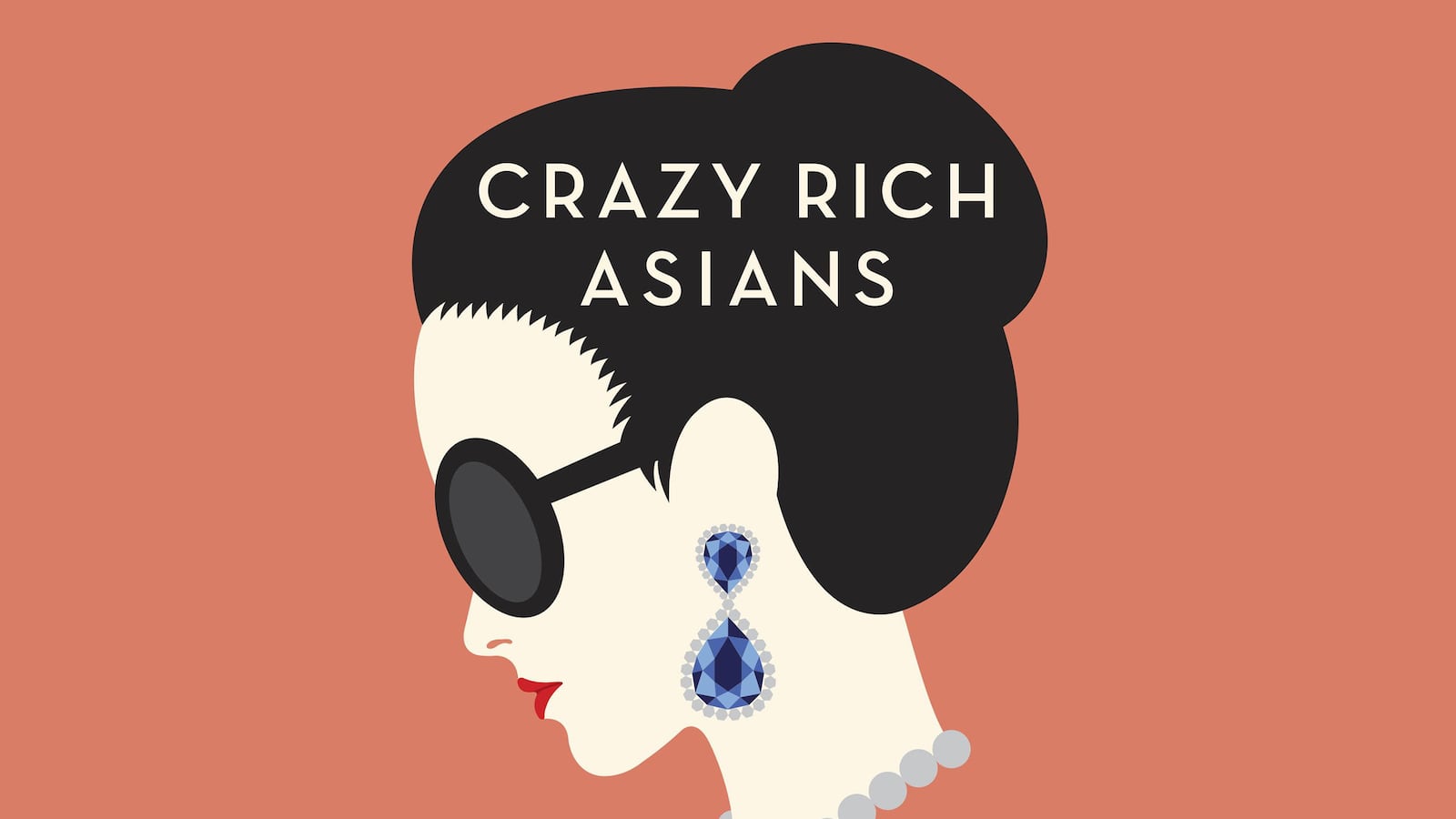Kevin Kwan’s aunt is one tough critic.
Though his debut novel, Crazy Rich Asians, was a vertiginous success— trumpeted as a “48-karat beach read,” optioned for a film by the very producers behind the Hunger Games movies, and has even now sired a just-out sequel, China Rich Girlfriend —his aunt in his native Singapore didn’t “get what all the fuss was all about,” he tells me.
Having long lived in the old-monied milieu that was Kwan’s primary bull’s-eye in the first book, the dowager-in-question mumbled, “What’s amusing about this? It’s kind of boring.”
When I suggest it’s because she’s part of the same society satirized in the book, the 42-year-old novelist, with his ink-jet helmet of hair, and black-on-black attire, nursing a glass of Coke, nods blithely: “Yes, she just doesn’t see it.” All of which he found “a relief.”
Though his novels are the equivalent of a Bubble Tea concoction laced with Henry James extracts and Jackie Collins sprinkles—tracking a level of wealth that makes even Downton Abbey look more like Downton Arriviste—he concedes he didn’t write it for an inside-Singapore audience, or an inside-Hong Kong one.

Rather, Kwan, goaded by his own privileged upbringing (he’s talked about growing up with “nannies and servants and all that”) had only one goal in mind: “I wanted to introduce a contemporary Asia to a North American audience.”
The new novel, picking up some time after Crazy Rich Asians, has the same DNA of “Dynasty on steroids,” as some called it, and “giddy wealth porn,” as Janet Maslin just did in the The New York Times.
Made up of several interlocking stories of a sprawling family—including that of a shell-shocked ABC (American Born Chinese) being indoctrinated into this world, and a former porn star trying to become a society swan—it feasts on a clash of cultures that makes up the Asian theater of the absurd.
To this end, we get a dance between the old-guard snoots (who’d rather hari-kiri than have their photos in the paper or—gasp—the cover of Hong Kong Tatler) and the insta-Chinese-rich (such as the playboy character, Carlton, who gets the novel roaring by crashing his red Ferrari 458 into the window of the Jimmy Choo boutique on London’s Sloane Street).
Unravelling the endless modes of snobbery is sport for Kwan, and the set pieces in China Rich Girlfriend are such that even Serena van der Woodsen might gasp.
A Gulfstream with a koi pond inside? Done. Also, done and done: a palatial estate, owned by one of Shanghai’s new moguls, in which “Jiro’s second cousin” (referring to Jiro Ono, of Jiro Dreams of Sushi fame) runs a sleek in-house sushi operation, and guests are only allowed to “sleep on Hastens mattresses stuffed with the finest Swedish horsehair.” (Purveyors to the Swedish royal family since 1852, we’re informed via footnote, their “basic mattresses start at $15,000, and their top-of-the-line 2000T will set you back $120,000.”)
It’s a book in which everyone is a VIP, and nothing is not OTT. And while his is the type of fiction that’s eagerly filled a gap—China Rich Girlfriend was singled out on Entertainment Weekly’s list of the summer’s six “most anticipated,” next to a list that included such household names as Stephen King and Harper Lee—if there’s one criticism of the book it is that it perpetuates a new rash of Asian stereotypes.
Or, as one agnostic put it, Kwan writes “some of the most vile, vapid, raunchy, and conniving Asian characters who have ever been created.”
His response to these barbs is pretty straightforward: He’s just the messenger. “It’s a world that actually exists, and if anything, it’s toned down,” he tells me.
Besides, was there an expectation that “something like Gossip Girl should speak for all white people?”
While the books might well be dismissed as enjoyable tripe, they play a more ingenious role, one can argue: Kwan breathes air into a world that we only know from fallow statistics found in the business section of the paper.
In the same way that Edith Wharton catalogued the Gilded Age via novels like The Age of Innocence, Kwan—in his novels—is doing his bit for a China that now has the second-highest number of millionaires in the world (skyrocketing by 82% over one year, wherein first-place U.S. only grew 18% over the same period).
Consider, too, a China that’s seen such a whiz-bang transformation that, to put it in perspective, it’s at “100 times the scale and 10 times the speed of the first industrial revolution which transformed Britain.”
Wharton, as it turns, is a muse for Kwan, who recalls an event he attended some years back hosted by the Edith Wharton Historical Society, held to mark a dedication to her home in New York City on 23rd Street.
“It’s a Starbucks now,” he adds.
We both then go on to enthuse about “Undine Spragg,” the incorrigible climber in Wharton’s 1913 work, Custom of the Country. “It’s so modern!” Kwan enthuses, agreeing that Undine could easily pass for a this-era Kardashian.
China’s real-life First Lady, Peng Liyuan, gets a call-out in China Rich Girlfriend. A syrupy sweet folk singer—beloved by a nation—she is considered the “secret weapon” of her husband, the president.
It would be like if “Barbra Streisand” married the United States president, Kwan tells me. “She really revolutionized the role of the First Lady, and is the first one to be so visible. She dresses in a really contemporary way, and has put several Chinese fashion brands on the map.”
Neither classic lit nor current affairs are the only wells pulled from by this satirist. Inevitably, he is also informed by years spent working in haute design.
After spending some of his formative years in Houston, and attending university there, the self-described “late-bloomer” wound up working for the M & Co., the high-profile creative design studio.
This led to gigs with stage-masters like David Rockwell, and, in particular, doing design books—“in a past life”—for deities like Oprah and Elizabeth Taylor (“They don’t make them like they used to.”)

It’s while we are discussing his past work designing books that the conversation takes a wholly unexpected turn—to Fidel Castro.
“He hates me,” Kwan says of the world’s oldest dictator. Kwan worked on an art book on Cuba, some years back, and in it they included a photo of Fidel with a mistress. And because of that, “I don’t think I’m allowed in,” he sighs, even if Cuba is “opening up” diplomatically these days.
Havana or not, Mr. Crazy Rich Asians has places to go, stories to spin. The movie based on his first novel is full steam ahead, he tells me—with Peter Chiarelli (who wrote The Proposal) doing a polish, and casting set to get underway this fall. And, yup, there are also plans for another novel to cap off what will be a trilogy.
“I’m about to go back into the cave,” says Kwan.




